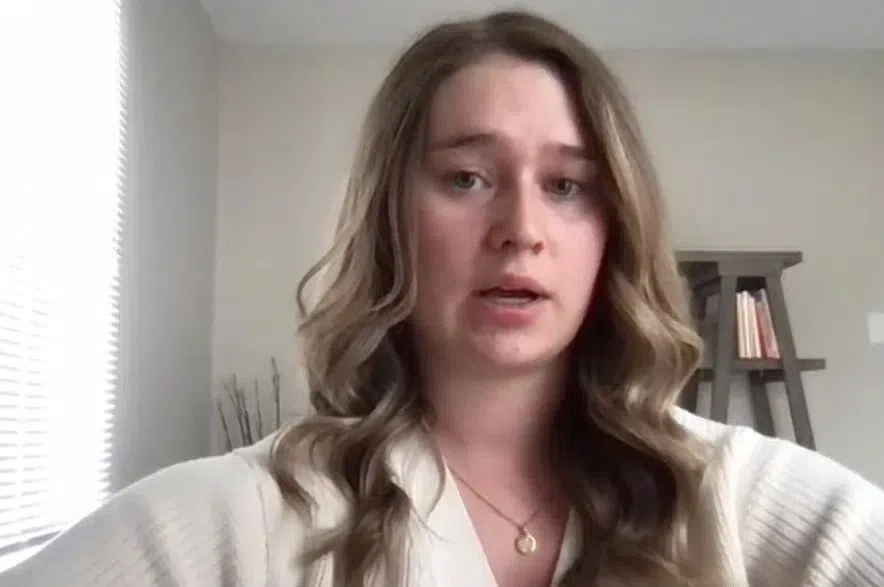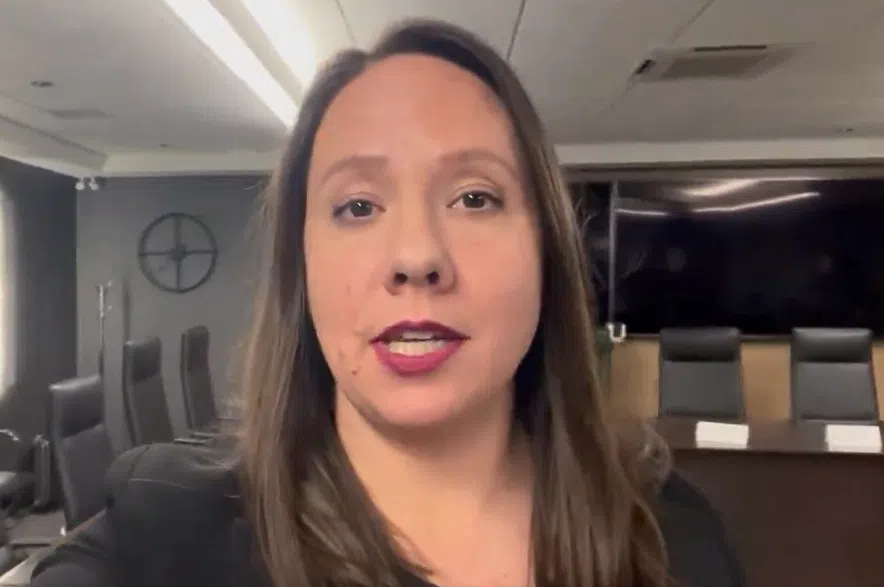The Saskatchewan Teachers’ Federation is shining a spotlight on in-class violence as its contract negotiations with the province remain at a standstill.
One teacher, Shelby, said she was attacked by a Grade 7 student who Shelby said was in an “escalated state” while she was on her way outside to supervise recess.
“I was repeatedly hit and kicked in the upper body and the head by the student, and I was told it took several staff members to get the student off of me and be able to restrain them,” Shelby told reporters at a virtual media conference held by the union on Wednesday.

Shelby, a Saskatchewan teacher, speaks about her experience with violence in the classroom at a virtual STF news conference on Feb. 21, 2024. (Saskatchewan Teachers’ Federation/Screenshot)
Shelby – whose last name the union would not share, citing privacy concerns – said she was treated in hospital for a broken nose and severe concussion as a result of the attack.

The injuries Shelby suffered when she was attacked by a student. (Saskatchewan Teachers’ Federation/Submitted)
“I stayed in a state of shock for about a month. I wasn’t really able to process what had happened or how severe it was,” she said.
Shelby said she went back to work 27 days later, but later transferred to a different school and no longer teaches in Saskatchewan. She said she now works with a therapist to navigate her anxieties after the attack.
“It took me quite a while to become comfortable teaching in a classroom by myself again,” she said.
Shelby said she doesn’t blame the student for what happened, but does blame the education system and the lack of government support that she said lets “Saskatchewan students fall through the cracks.”
Samantha Becotte, president of the Saskatchewan Teachers’ Federation, shared other stories from teachers who said their lives were impacted by classroom violence.
The anecdotes shared included teachers having furniture thrown at them, being charged at by students and being left with a broken jaw after an attack.
Becotte said violence is becoming a regular occurrence in schools across Saskatchewan.
Samantha Becotte, president of the Saskatchewan Teachers’ Federation, says in-class violence is a symptom of what she called underfunding in education. (Saskatchewan Teachers’ Federation/Twitter)
“Teachers know that these incidents are at no fault of the students who were involved,” Becotte said.
“Violent incidents are a symptom of underfunding and are a clear sign that there is not enough support for students or teachers in our schools.”
In survey of teachers conducted by the union, 35.4 per cent said they experienced violence in their working environment in the past five years. The union head said four out of five teachers who experienced violence saw multiple incidents over that period.
In addition, Becotte said 40 per cent of the surveyed teachers reported experiencing workplace harassment in the past five years, which she said is up from 32 per cent in 2021.
Becotte said unlike other jurisdictions, Saskatchewan does not have a provincial online reporting procedure. As a result, she said, education leaders in the province lack the necessary data to meaningfully respond to harassment and violence in schools, while many incidents go unreported.
While teachers are covered under the occupational health and safety portion of the Saskatchewan Employment Act, Becotte said the patchwork of legislation and school division policies doesn’t work.
The union head said a confidential reporting mechanism is a necessary improvement to the education system, noting that the issue ties into the federation’s bargaining proposal around classroom complexity. That proposal includes staff-to-student ratios for professional support positions in schools, including teachers, mental-health professionals and educational psychologists.
Becotte said addressing these concerns in a collective bargaining agreement is possible.
On Tuesday, teachers’ federations from New Brunswick, Ontario and British Columbia joined Becotte at a news conference to explain how stipulations around class size and class complexity are built into their collective agreements.
Deadlocked negotiations between the province and the union led to rotating strikes by teachers and the withdrawal of noon-hour supervision across the province on Friday.
Becotte said the union is looking at longer-term plans, but noted that 48-hours’ notice will be given ahead of any new sanctions.
She said the union will be happy to get back to the bargaining table when a new mandate is provided to the Government-Trustee Bargaining Committee, allowing it to include class size and classroom complexity in negotiations.
Government responds
A statement from Saskatchewan’s Ministry of Education says the Government-Trustee Bargaining Committee (GTBC) is at the bargaining table waiting for the union to return.
According to the province, another invitation was extended to teachers Wednesday morning, and a response had not been received from the STF.
“The government has moved on a number of items the Saskatchewan Teachers’ Federation (STF) asked for, including workplace safety which is one of many areas the GTBC is prepared to discuss at the table as part of its renewed mandate,” the statement read.
The province has proposed an agreement outside of the bargaining table with the union to annualize the $53.1 million in additional funding to be put towards class size and complexity.
According to the ministry, employers and school divisions are responsible to follow all Occupational Health and Safety requirements to have support plans for student staff and safety as well as to provide a safe work environment.
The statement noted that the provincial government amended The Saskatchewan Employment Act to further protect employees like teachers from workplace violence.












